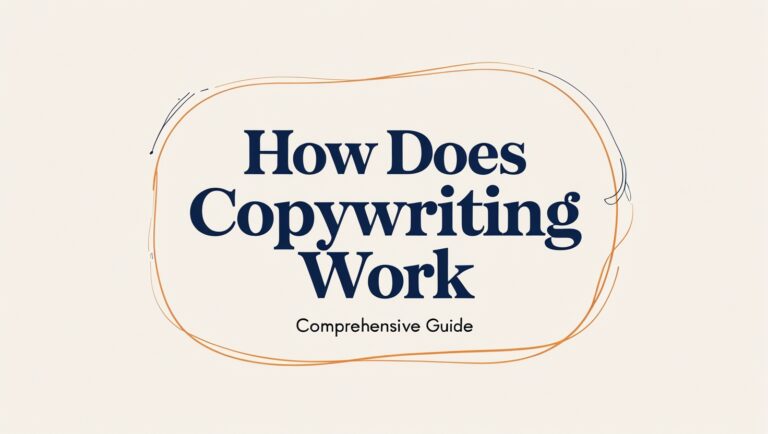How Copywriting Opens Doors to Other Careers
Copywriting opens doors for professionals seeking flexibility, financial stability, and career advancement. It is a core skill that intertwines creativity with marketing, allowing you to powerfully communicate ideas to any target audience.
In this article, you will learn how mastering copywriting fosters growth in various industries. Moreover, you will discover how this writing niche can connect you to high-paying opportunities, new professional networks, and a broader range of career possibilities.
The Transformative Power of Copywriting
Have you ever wondered how some writers rise to the top of marketing campaigns and business strategies? The answer often lies in copywriting skills. Effective copywriting attracts attention, persuades customers, and drives tangible results.
Copywriting is not just about writing words. It is about conveying emotion and building trust, ultimately turning casual readers into paying clients. Yet many do not realize that copywriting opens doors far beyond simple sales letters.
By reading on, you will discover how to harness this powerful craft. You will also see real-world examples of how simple writing techniques can translate into life-changing professional shifts. Whether you are an aspiring freelancer or a seasoned professional, this article will show you how to leverage copywriting to achieve multiple career goals.
Why Copywriting Is a Realistic Career Choice
Copywriting is more than just a passing trend. It has become a pillar of modern marketing for businesses worldwide. Whether you plan to work for an agency, start your own business or freelance from home, copywriting offers consistent demand and adaptable working conditions.
Moreover, technology has made remote work and digital collaboration easier than ever before. As a result, many companies seek skilled copywriters who can contribute from anywhere in the world. If you desire a career with minimal location constraints, copywriting can be a perfect fit.
The Myths vs. Reality
Some people question if copywriting is still lucrative or even realistic in today’s saturated digital landscape. The reality is that competition exists, but opportunities are also growing. Digital marketing, e-commerce, and content creation all hinge on persuasive writing. This growth means more businesses than ever need well-trained copywriters who can deliver results on multiple platforms.
Copywriters who invest in professional development—learning new marketing trends, mastering persuasive techniques, and staying current with emerging channels—often command higher fees and steady work. That dedication ensures a sustainable career path with varied income streams. Copywriting truly opens doors for anyone willing to refine their skills and adapt to market demands.
Expanding Horizons—What Other Jobs Can Copywriters Do?
Many aspiring wordsmiths wonder: What other jobs can copywriters do? Copywriters possess unique talents that can be repurposed in several roles. You already have expertise in persuasive language, storytelling, and clear communication. These strengths easily transfer to related positions.
Here are a few examples:
- Content Marketing Specialist – Crafting blog posts, newsletters, and social media updates for brand visibility.
- Marketing Consultant – Advising businesses on campaign strategies, brand positioning, and messaging.
- Public Relations Writer – Creating press releases and media kits to shape public perception.
- UX Writer – Enhancing user experience by writing concise, intuitive copy for websites and apps.
- Creative Director – Leading creative teams, planning campaigns, and overseeing the brand voice.
Additionally, some copywriters branch into ghostwriting for thought leaders, executives, or influencers. Others use their communication skills in instructional design, writing training materials that simplify complex topics for specific audiences. The ability to write persuasively lays a foundation for multiple career tracks, showcasing how copywriting opens doors to broader professional goals.
Adding Value to Any Organization
Regardless of the job title, copywriters excel at one critical skill: moving an audience to action. This aptitude is invaluable in fields like sales, customer service, and even product development. Furthermore, as you accumulate experience, you naturally build a portfolio that highlights your ability to influence buyer behavior. That portfolio can then unlock managerial or leadership positions, demonstrating your capacity to oversee a team of writers or coordinate large marketing projects.
Mastering the Craft—Can You Make $10,000 a Month with Copywriting?

Short answer: Yes, it is entirely possible to earn $10,000 per month as a copywriter. Although this level of income requires a strategic approach, dedication, and consistent client acquisition, it remains a reachable goal for many.
Keys to a $10,000 Monthly Income
- Specialize and Differentiate
Identify a niche or industry in which you can become an expert. Specialization positions you as a premium copywriter, allowing you to charge higher fees. You can become the go-to writer for healthcare technology, financial startups, or direct-response email campaigns. - Build a High-Value Portfolio
Showcase your results for previous clients. Highlight measurable data such as increased conversions, higher email open rates, or improved sales. This proven impact justifies premium pricing. - Pursue Ongoing Contracts
Secure retainers or monthly agreements with stable clients. Repeat business reduces the time and effort you spend on marketing yourself. - Develop Additional Services
Offer related services like content strategy, SEO consulting, or brand messaging. Upselling these complementary skills can significantly boost your monthly income.
As you refine your process and demonstrate consistent outcomes, you can command higher rates. Some elite copywriters earn well above $10,000 per month through a blend of corporate clients, royalties, and performance-based contracts. In essence, your earning potential depends on how well you position yourself in the marketplace.
Is Copywriting a Good Career for Introverts?
Copywriting often attracts individuals who enjoy working behind the scenes. They excel at independent thought and are adept at crafting compelling messages without constant social interaction. If you identify as an introvert, copywriting could be a remarkable fit.
Flexibility and Autonomy
Many introverts thrive in environments with fewer interruptions and more control over their schedule. Copywriting frequently allows for remote or freelance work, so you can choose settings that preserve your energy. Moreover, client communications often happen via email or scheduled calls, helping you manage your social bandwidth more effectively.
Building Quiet Confidence
Being introverted does not mean you lack communication skills. Instead, it means you might prefer meaningful, one-on-one conversations. These traits can be advantageous in writing, where empathy and deep insight into the reader’s mindset are critical. By leveraging your natural introspection, you can produce emotionally resonant copy that stands out in a crowded marketplace.
Overcoming Stress—Is Copywriting Stressful?
Copywriting can be stressful at times, especially when juggling deadlines or handling multiple projects. However, it is often less stressful than many other high-pressure professions. The stress usually comes from managing client expectations, meeting short timelines, or staying current with ever-evolving market trends.
Strategies to Stay Grounded
- Set Realistic Timelines
Clearly negotiate project deadlines at the outset. Ensure you have enough time for research, drafting, and revising. - Organize Your Workflow
Use project management tools or simple spreadsheets to track daily tasks. Prioritize the most urgent assignments first, then schedule breaks to avoid burnout. - Maintain Clear Boundaries
Define your work hours and stick to them. Resist the urge to check emails or messages at all hours of the night, which can heighten stress. - Communicate Early and Often
If a project scope changes, notify clients immediately. Regular updates prevent last-minute surprises and reduce pressure on both parties.
By implementing these habits, you can reduce stress and maintain a more balanced work-life dynamic. Most importantly, the rewards and possibilities of copywriting often outweigh any short-term stressors.
Is Copywriting Still Lucrative in the Digital Age?
The digital age has indeed heightened the need for persuasive writing. Businesses compete in crowded online markets, striving to stand out and connect with their audience on a personal level. Well-crafted copy is at the heart of these endeavours, making copywriting as lucrative as ever.
The Most Lucrative Type of Copywriting
What is the most lucrative type of copywriting? While this can vary based on market demand, direct-response copywriting commonly tops the list. Direct-response copy aims for immediate, measurable actions, such as clicking a link, signing up for a newsletter, or making a purchase. Because of its direct impact on sales, businesses pay premium rates for effective direct-response writers.
Why Direct-Response Copy Pays More
- It is directly tied to revenue.
- Results can be measured quickly, making ROI clear.
- Skilled direct-response copywriters can dramatically boost conversions.
- Companies invest heavily to scale their marketing efforts.
Besides direct response, other high-paying arenas include writing for specialized industries like pharmaceuticals, software as a service (SaaS), and technical B2B. These sectors often have higher marketing budgets and complex products, requiring copywriters with advanced knowledge and persuasive expertise.
Setting Your Rates—Do Copywriters Get Paid a Lot?
Many emerging writers ask, Do copywriters get paid a lot? Experienced copywriters can indeed earn comfortable incomes. This compensation typically rises with experience, specialization, and a proven track record.
Factors That Influence Your Earnings
- Experience and Reputation
Building a trustworthy personal brand and solid testimonials often leads to higher fees. - Client Base
Working with established companies or high-budget startups typically brings more lucrative projects. - Niche Expertise
Specialized knowledge in areas like finance or healthcare commands higher rates due to industry complexity. - Geographic Location
Rates can vary based on where you or your clients are located, although remote work can mitigate this factor.
As you climb the ladder, you might transition into roles with salaries ranging from modest freelance incomes to six-figure agency positions. According to the U.S. Bureau of Labor Statistics, the median annual wage for writers and authors was around $67,120 in recent years. Copywriters often earn more than that median when focusing on high-value projects or specialized industries.
Daily Life of a Copywriter—What Do Copywriters Do All Day?

A copywriter’s day can vary depending on whether they work in-house, at an agency, or independently. Yet, most share common activities aimed at crafting compelling, strategic messages.
Typical daily tasks include:
- Research: Understanding the target audience, competitive landscape, and brand voice.
- Brainstorming and Outlining: Planning headlines, subheadings, and angles to capture attention.
- Writing and Editing: Crafting engaging sentences that guide readers toward a specific goal.
- Client Communication: Discussing project objectives, providing updates, and receiving feedback.
- Revisions: Fine-tuning words for clarity, tone, and maximum impact.
Overall, a copywriter’s work revolves around strategic creativity. You write to influence, persuade, and connect deeply with readers’ needs and desires.
Side Income Potential—Is Copywriting a Good Side Job?
Copywriting can be a fantastic side job for several reasons. First, it allows you to exercise creative skills while earning money. Second, you can work from anywhere, setting your hours around a full-time role or family responsibilities.
Because you often get paid per project, you can gradually scale your workload as your skills grow. Some individuals start with just a few hours a week, working on small social media ads or blog content. Over time, these part-time efforts can evolve into a full-fledged freelance business if you decide to go all in.
Balancing a Side Hustle
Careful scheduling is key when balancing copywriting with other obligations. You might allocate evenings or weekends to writing, ensuring you do not burn out or neglect your primary commitments. By setting clear goals—like earning an extra $1,000 a month or building a portfolio within six months—you can measure progress and stay motivated.
Enhancing Your Success—Practical Steps to Thrive
Becoming a successful copywriter requires more than just raw talent. You need structure, strategy, and a willingness to refine your craft. Below are practical steps to help you advance quickly.
- Invest in Education
Consider short courses or certifications that bolster your marketing knowledge. The more you understand consumer psychology, SEO, and conversion tactics, the more valuable your work becomes. - Practice Consistently
Write every day, even if it is just for 20 minutes. Regular practice hones your ability to craft persuasive messages on demand. - Seek Feedback
Join writing communities or mastermind groups. Constructive criticism accelerates growth and helps you avoid common pitfalls. - Showcase Results
Whenever possible, document the impact of your copy. Keep track of conversions, engagement metrics, or sales figures tied to your projects. - Network and Collaborate
Attend marketing conferences, webinars, or local meetups. Building relationships with peers and potential clients is crucial for long-term growth.
Taking these steps will help you position yourself as an indispensable asset to clients. Over time, these efforts compound, leading to recurring work and higher fees.
Overcoming Common Obstacles
Even seasoned copywriters face occasional roadblocks. The key is to anticipate these challenges and prepare solutions in advance.
- Creative Burnout: When projects overlap and deadlines loom, your creativity can wane. To combat this, schedule mini-breaks or switch tasks temporarily to refresh your mind.
- Tight Deadlines: Mastering effective time management is crucial. Use tools like Trello or Asana to keep projects on track.
- Client Mismatch: Sometimes, you and a client may not align in terms of style or expectations. Resolve this early by clarifying guidelines and project scopes before signing any contract.
- Imposter Syndrome: Self-doubt can creep in, especially if you are new. However, remember that every writer started somewhere. Reflect on your successes and keep learning to build confidence.
When you focus on proactive solutions, you can maintain a steady trajectory in your career. Challenges become stepping stones rather than roadblocks.
Real Stories—Copywriting Success in Action
Consider the story of a freelance copywriter who specialized in fitness email campaigns. After a few years of honing her skills, she began charging premium rates due to her consistent results, increasing client revenue by as much as 40%. Within a year, she was earning over $12,000 monthly just from repeat clients.
Another example involves a copywriter working for a digital marketing agency. He started with entry-level projects, writing social media ads. Through consistent learning and performance-based successes, he moved up to writing full-scale landing pages and online sales funnels. Eventually, his expertise helped him launch his own consultancy, allowing him to work fewer hours but triple his income.
These stories illustrate how mastering copywriting truly opens doors. With dedication, strategic positioning, and continuous improvement, you too can create a transformative career path.
Internal and External Resources
Building a thriving copywriting career often involves surrounding yourself with the right resources. Seeking out reputable courses, tools, and communities can shorten your learning curve significantly.
- Internal Link: Do You Need to Bid for Work on Sites Like Upwork? – Learn how to navigate freelance marketplaces effectively and whether this approach aligns with your business goals.
- External Link: Content Marketing Institute – Stay updated on the latest trends and techniques in content strategy, a field closely related to copywriting.
These resources can serve as starting points for ongoing education. As you immerse yourself in expert insights, you will uncover new strategies to refine your writing and expand your professional network.
Building a Portfolio That Showcases Your Value

Your portfolio is your calling card. A well-curated portfolio highlights your versatility, creativity, and proven results. Whether you specialize in blog writing, social media ads, email sequences, or sales pages, show a range of your best samples.
Elements of a Standout Portfolio
- Client Testimonials
Include short endorsements from satisfied clients, emphasizing tangible results. - Before-and-After Comparisons
Show how your copy improved conversions, sales, or engagement metrics compared to the previous version. - Project Descriptions
Offer brief insights into your strategy, research process, and achievements for each sample. - User-Friendly Design
Present your samples in a clean, organized layout. This helps potential clients easily evaluate your capabilities.
A compelling portfolio immediately conveys credibility. It assures potential clients that hiring you is a sound investment, reducing the perceived risk of onboarding a new writer.
Negotiating Your Worth—What Is the Best Copywriter Salary?
What is the best copywriter’s salary? This depends on your approach, experience, and clientele. Some copywriters prefer a full-time, in-house role with a consistent salary and benefits. Others choose freelance work, where potential earnings can exceed traditional salaried positions—especially if you land lucrative contracts.
Deciding Between Freelance vs. In-House
- Freelance
- Pros: High earning potential, flexible schedule, varied projects.
- Cons: Irregular income, responsibility for your own benefits and taxes.
- In-House
- Pros: Steady paycheck, structured environment, team collaboration.
- Cons: Limited income growth unless you climb the corporate ladder, less control over project choice.
Ultimately, “best” is subjective. If stability and collaboration are priorities, an in-house role may suit you well. However, if you crave independence and the possibility of higher pay, freelancing or consulting might be your ideal path.
Conclusion
By now, you have seen how copywriting opens doors to financial security, creative fulfilment, and a wide array of professional roles. Whether you aim for a comfortable side income or a full-time, high-revenue career, the fundamental skills of persuasion and clear communication are priceless.
If you are ready to harness the power of words, start by taking small, deliberate steps. Invest in your education, build your portfolio, and refine your marketing approach. Once you do, you will see firsthand how copywriting opens doors and transforms your professional journey.
Call to Action: Take the leap by setting up your first portfolio piece or enrolling in a specialized course. Share this article with a friend who might also benefit from a dynamic, flexible career. Together, you can explore the boundless potential that copywriting has to offer.
FAQ
Can You Make a Career Out of Copywriting?
Yes. Copywriting is a marketable skill that can be parlayed into a steady career. You can work freelance, in-house at an agency, or for major corporations needing full-time writers.
Is Copywriting a Realistic Career?
Absolutely. Businesses around the world require persuasive writing for ads, websites, emails, and marketing materials. As long as you keep learning and adapting to market needs, copywriting remains a realistic, sustainable career option.
What Is the Copywriter’s Day-to-Day Like?
A copywriter spends time researching, drafting, editing, and collaborating with clients or team members. The day-to-day can vary widely, but most copywriters focus on crafting clear, persuasive messages that deliver measurable results.







One Comment
Comments are closed.